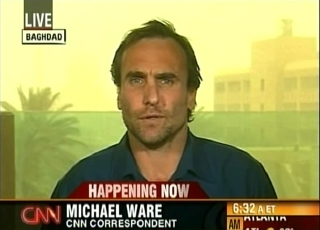AAM: "You can pull out tomorrow as long as you're ready to wear the consequences."

Length: 3:45
LARGE (43.5 MB) ----- SMALL (4.5 MB)
Michael recaps the current status of the war and the SOFA talks.
KIRAN CHETRY, CNN ANCHOR: And as we showed you live at the top of the show, President Bush is in London this morning and he's talking with Prime Minister Gordon Brown. One of the main topics on the table: Iraq. President Bush spoke about England's presence on the front lines.
(BEGIN VIDEO CLIP)
GEORGE W. BUSH, PRESIDENT OF THE UNITED STATES: I know there's a lot of discussion here in the British press about -- well, you know, has he given enough troops or not enough troops and all that business. And as he trying to distance this, that and the others, you know, typical.
But it's -- I just want to remind you that he has left more troops in Iraq than initially anticipated. And like me, we'll be making our decisions based upon the conditions on the ground, the recommendation of our commanders, without an artificial timetable set by politics.
(END VIDEO CLIP)
CHETRY: And CNN correspondent Michael Ware joins us from Baghdad now.
So, he said again, as he's said before, about decisions based on conditions on the ground. What are those conditions right now, Michael?
MICHAEL WARE, CNN INTERNATIONAL CORRESPONDENT: Well, Kiran, right now in relative terms, the war in Iraq is in better shape, clearly, than it was a year or two years ago.
We're sort of at levels of violence pre the worst days of Fallujah in 2004. That's undisputed. Civilian deaths are down. Sectarian murders in Baghdad alone are down by more than 90 percent. So, that's the condition.
Yes, things are quieter on the surface. The real question is, what did America have to do to achieve this and what're going to be those implications: tearing apart the social fabric of Iraq, institutionalizing the sectarian cleansing, walling off sectarian communities -- literally, we've got blast barriers in the capital -- and then those communities that did not have Iranian-backed militias to protect them, America funded and supports American-backed militias to protect those communities.
We're also seeing the on-going American support of an Iraqi government that does not support America. As General Petraeus himself says, the President of Iraq -- the reality of life -- is an agent of influence for Iran. So, yes, the conditions on the ground do look better if you look just at the thin veneer of the surface, Kiran. Scratch a little bit deeper and there's a lot more to be said.
CHETRY: In fact, I think some of those sentiments were echoed by Iraq's Foreign Minister Zebari, who talked to Wolf Blitzer yesterday. Let's hear a little bit about what he said on "LATE EDITION."
(BEGIN VIDEO CLIP)
HOSHYAR ZEBARI, IRAQI FOREIGN MINISTER: Iraq has been to hell many times and back. And now, we have the right policies, the right personnel and we have a committed government to accomplish its national agenda. And the surge strategy has worked.
(END VIDEO CLIP)
CHETRY: He said to accomplish its national agenda. So, what is the next step of that final handover to Iraqis when the U.S. troops can then come home?
WARE: Well, obviously, the big step right now is the negotiations for an agreement between Washington and Baghdad. The U.N. mandate, essentially the authority for this war, runs out at the end of the year. The clock is ticking. Baghdad and Washington are going back and forth over the terms of these conditions.
The Iraqi government, however, is threatening to go it alone. Pass their own legislation in their own Congress to dictate to the next president how many troops he can have, where they'll be, and what they can do.
So, the next step is going to be about how much is America prepared to give or sell away in return for a troop homecoming or preservation of American interests in the region. Right now, Iran has the upper hand. Iran is the clear winner of the war so far. You can pull out tomorrow as long as you're ready to wear the consequences.
Kiran?
CHETRY: Michael Ware, great to get your perspective as always from Baghdad this morning. Thanks.
